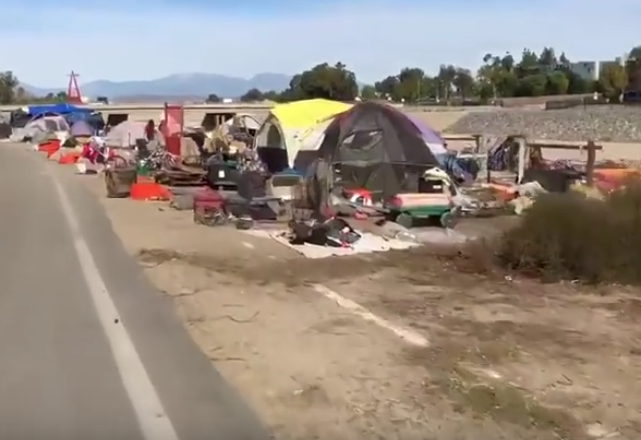The diseased streets of San Francisco spread to rest of California

We recently took a look at the diseased streets of San Francisco, after local reporters revealed a dangerous mix of drug needles, garbage, and feces spread throughout the city’s downtown area.
Now, as the number of homeless camps across the state skyrocket, union officials for highway maintenance workers are demanding health and safety protections for state employees who are exposed to the biological detritus while cleaning up roadside encampments.
In an official grievance filed last week, the union representing California’s maintenance workers accused the state of subjecting its members to hazardous conditions without proper training or equipment.“It is the Union’s contention that Caltrans is not ensuring that our members are being provided the appropriate Personal Protective Equipment (PPE), necessary training, necessary vaccinations and proper compensation for the dangerous hazmat duties they are performing when cleaning up homeless encampments on State Caltrans property,” International Union of Operating Engineers director Steve Crouch said in the complaint.Crouch told KTVU on Monday that maintenance crews often have to work in areas where the ground is muddy, slippery and ridden with debris that can include objects that are exceedingly sharp. Other items are simply dangerous to touch, such as potentially toxic or biologically unsafe materials.
Workers who are potentially exposed to bloodborne pathogens (such as Hepatitis B or HIV) are required under both state and federal law to have vaccinations, training, and proper PPE. Therefore, the claims being made by state employees are very troubling.
One Caltrans worker, who asked not to be named for fear of retribution, said he has been involved in at least six cleanups so far this year.“I’ve been exposed to blood, needles, women’s feminine products… five-gallon buckets of human feces,” he told The Bee.His protective gear? A pair of gloves, he said.“And that’s really not protective,” he quickly added. “It’s funky, and I’m putting this politely. It’s extremely nasty. You never know what you’re going to step in.”
If these allegations prove true, and the regulating agencies follow-up, the penalty could be in the hundreds of thousands of dollars that this state cannot afford to lose. For example, the federal Occupational Safety and Health Administration (OSHA) fines the United States Postal Service over $300,000 after inspectors find workers exposed to bloodborne pathogen hazards at a Maryland facility in 2016.
But bacterial infections and exposure to viruses isn’t the only hazard these highway workers face. Workplace violence is also a significant concern for those who clean homeless camps.
Sometime they have pit bulls in there, They’ll, you know, let the dogs loose to chase the Caltrans workers out. Sometimes they’ll throw rocks at the Caltrans workers,” said Crouch. Add to that: live electrical lines and even the occasional weapon…”Their job is to maintain the highways and freeways, you know, that’s filling the potholes, that’s doing the striping of the lines, that’s doing the guardrails alone the edge, that’s trimming the trees and shrubs and bushes along the highway. Their job is not to clean up homeless encampments,” said Crouch.
If Caltrans employees are expected to be hazmat employees, then they do need to be paid and trained as such. Otherwise, California is going to have to assign the tasks to another group of properly trained and protected employees.
The homeless may be living “cheaply”, but the expenses for the rest of us are exploding so that we can maintain at least the appearance of First World living. In its latest budget, Los Angeles alone has doubled the amount that it spends on addressing homeless issues (projected to be $430 million), and most of the money to pay for these services is being borrowed.
No matter the outcome of the union grievance, it is certain that it will not address the root causes of the rapid expansion of the homeless population in California. I anticipate more money will be squandered, and public health issues will not be adequately addressed, for quite some time. Hopefully, however, our workers will be better protected and paid for obviously hazardous work.
CLICK HERE FOR FULL VERSION OF THIS STORY